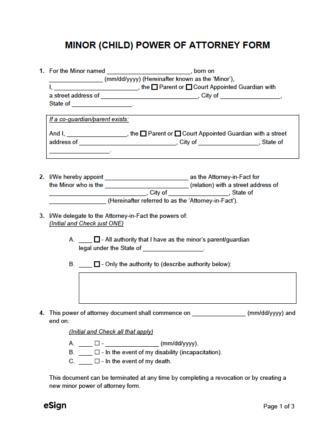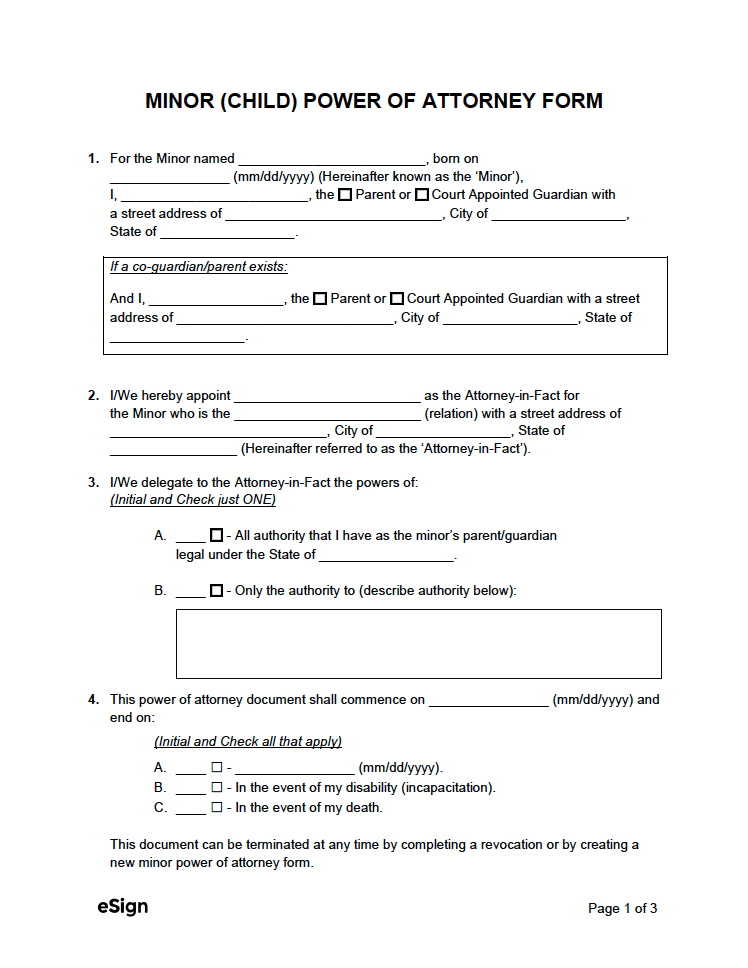Commonly used when a parent will be:
- Traveling out of state or country without their child.
- Deployed on active military duty.
- Receiving long-term medical care.
- Serving a prison sentence.
- Moving to another city or state without their child.
Minor Child Power of Attorney: By State
- Alabama
- Alaska
- Arizona
- Arkansas
- California
- Colorado
- Connecticut
- Delaware
- Florida
- Georgia
- Hawaii
- Idaho
- Illinois
- Indiana
- Iowa
- Kansas
- Kentucky
- Louisiana
- Maine
- Maryland
- Massachusetts
- Michigan
- Minnesota
- Mississippi
- Missouri
- Montana
- Nebraska
- Nevada
- New Hampshire
- New Jersey
- New Mexico
- New York
- North Carolina
- North Dakota
- Ohio
- Oklahoma
- Oregon
- Pennsylvania
- Rhode Island
- South Carolina
- South Dakota
- Tennessee
- Texas
- Utah
- Vermont
- Virginia
- Washington
- West Virginia
- Wisconsin
- Wyoming
Contents |
Sample
Download: PDF (Blank) | PDF (Sample Data)
MINOR (CHILD) POWER OF ATTORNEY FORM
1. THE PARTIES. For the minor child named [MINOR CHILD NAME] born on [MM/DD/YYYY] (Hereinafter the “Minor”),
Parent / Guardian: I, [PARENT/GUARDIAN NAME], the Parent or Court-Appointed Guardian, with an address of [MAILING ADDRESS],
Parent / Co-Guardian (if applicable): and I, [PARENT/CO-GUARDIAN NAME], the Parent or Court-Appointed Guardian with an address of [MAILING ADDRESS], (I/We hereinafter known as the “Parent(s)/Guardian(s)”),
Attorney-in-Fact: hereby appoint [ATTORNEY-IN-FACT NAME] as the Attorney-in-Fact for the Minor, who is the [RELATION TO CHILD] with an address of [MAILING ADDRESS]. (Hereinafter the “Attorney-in-Fact”).
2. POWERS. I/We, the Parent(s)/Guardian(s), delegate the Attorney-in-Fact the powers of: (Initial and Check ONE)
[INITIAL] ☐ – All authority I/We have under the State of [STATE].
[INITIAL] ☐ – Only the authority to [DESCRIBE AUTHORITY HERE].
3. COMMENCEMENT. This Power of Attorney shall commence on [MM/DD/YYYY] and terminate on [MM/DD/YYYY]. Irrespective of the end date, this power of attorney shall terminate in the event of my incapacitation or death.
4. STATE LAW. This Power of Attorney shall be governed under the laws in the State of [STATE].
5. SIGNATURES.
Parent/Guardian Signature: _______________________ Date: [MM/DD/YYYY]
Print Name: [PARENT/GUARDIAN NAME]
Parent/Guardian Signature: _______________________ Date: [MM/DD/YYYY]
Print Name: [PARENT/GUARDIAN NAME]
6. ACCEPTANCE BY ATTORNEY-IN-FACT.
The undersigned Attorney-in-Fact acknowledges and executes this Power of Attorney and by such execution, does hereby affirm that I accept the appointment and understand the duties under this Power of Attorney and state law.
Attorney-in-Fact Signature: _______________________ Date: [MM/DD/YYYY]
Print Name: [ATTORNEY-IN-FACT NAME]
7. WITNESS AFFIRMATION.
I witnessed the execution of this Power of Attorney by the Parent(s)/Guardian(s), and I affirm that the Parent(s)/Guardian(s) appeared to me to be of sound mind, was/were not under duress, and the Parent(s)/Guardian(s) affirmed to me that he/she/they were aware of the nature of this Power of Attorney and signed it freely and voluntarily.
Witness Signature: _______________________ Date: [MM/DD/YYYY]
Print Name: [WITNESS NAME]
Address: [WITNESS ADDRESS]
Witness Signature: _______________________ Date: [MM/DD/YYYY]
Print Name: [WITNESS NAME]
Address: [WITNESS ADDRESS]
8. NOTARY ACKNOWLEDGMENT.
State of [STATE]
County of [COUNTY]
On [MM/DD/YYYY], before me appeared [PARENT/GUARDIAN NAME(S)] as the Parent(s)/Guardian(s) who proved to me to be the above-named person(s), and in my presence, executed the foregoing instrument and acknowledged that they executed the same as their free act and deed.
_________________________________________
Notary Public
Print Name: [NOTARY NAME]
My Commission Expires: [COMMISSION EXPIRATION]
(Notary Seal)
What is Minor Power of Attorney?
Minor power of attorney is a position given by a parent (the “principal”) to another individual (the “agent”) that grants them the responsibility of caring for their child for a length of time. Usually the maximum length of time is one (1) year, but this differs state by state. The financial responsibility for the child remains with the parent(s), although the agent may provide financial assistance when necessary. By giving power of attorney, the parent is not handing over legal custody of their child but temporary parental rights. The form can be revoked at any time by the parent by delivering a revocation form to the agent.
Depending on the state in which the parents reside, it may be illegal for the agent to handle matters relating to transferring real property, consenting to the child’s marriage, and permitting adoption.
Who should I choose as the agent?
The parent(s) should preferably choose someone with the following qualities:
- Trustworthy
- Parenting experience
- Understands and accepts the significance of the responsibility
What parental rights does it give the agent?
Once the document is signed, the agent will receive almost all of the rights normally reserved for the child’s parents. This can include the right to manage the following duties:
- Handle medical matters (schedule appointments, request treatments, etc.).
- Enroll the child in school.
- Sign them up for extracurricular activities.
- View any documents and records relating to health and education.
If the parent(s) would like to limit their agent’s rights in one (1) or more areas, they can exclude certain powers when completing the POA form.
How to Give Minor Power of Attorney
- Step 1 – Identify the Agent
- Step 2 – Complete the POA
- Step 3 – Sign the Form
- Step 4 – Give to the Agent
Step 1 – Identify the Agent
Anyone can serve as the agent as long as they are over eighteen (18) years old. However, just like a parent wouldn’t let anyone babysit their child, they should be very selective with whom they nominate as their agent. When selecting an agent, a parent should consider whether that person has meets the following conditions:
- They are trustworthy.
- They can be a positive role model.
- They have experience with children.
- They will be able to provide a stable and safe home environment.
- They are financially secure.
Step 2 – Complete the POA
The form is a total of three (3) pages, which asks the parent(s) for the following specifications:
- What powers will be granted to the agent (full or limited).
- When the POA will begin and end.
- What state laws the POA will be governed by.
Additionally, the following information will be required regarding the child, parent(s), and agent:
Child
Parent(s)
Agent
|
Step 3 – Sign the Form
Each state has its own requirements for how a power of attorney must be signed. The requirements must be met in order for the form to be legally valid and binding. This will require the principal (parent) to have their signature witnessed and/or notarized. While having both is rarely mandatory, doing so can aid in proving that the parent(s) issued the power of attorney.
Notarize – Once the form has been filled out, save it to your computer and upload it to the homepage to notarize the form completely online. The service costs $25.
Step 4 – Give to the Agent
The parent(s) should provide the agent with the completed power of attorney. A copy should be retained by the parents and any other applicable parties. Parent(s) can give a copy to their attorney, the school district, and any other entity that may require it. The parent should make a note of all entities that received a copy in the event they need to revoke the agent’s powers.
Minor Child POA Laws: By State





